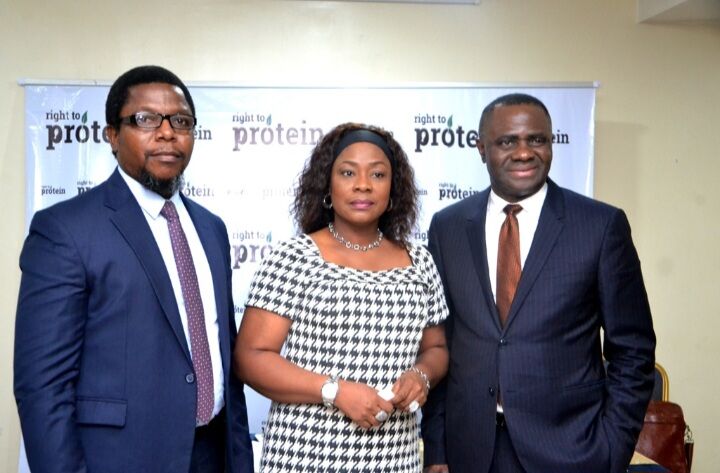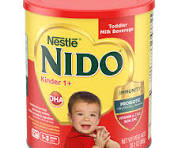[ad_1]
By Ijeoma UKAZU
Protein comes from a variety of sources, including meat, milk, fish, soy, and eggs, as well as beans, legumes, and nut butter. These foods are important to the structure, function, and regulation of the body.
Nutrition experts say while we can survive just fine by consuming a low-carb diet, the same cannot be said for a low-protein diet.
According to the Nigerian Protein Deficiency Report 2020, a total of 92.7 million Nigerians do not eat any protein in a day. This showed that about half of the country’s population or 45 percent are protein deficient as they lack access to sufficient protein and thus do not consume the daily recommended grammage.
The Food and Agriculture Organization of the United Nations, FAO, recommended a minimum per capita daily protein intake of 53.8g, with a global daily intake of 64g. However, in Nigeria, the daily protein intake is 45.4g, the Nigerian Protein Deficiency Report 2020 showed.
The survey further points out that, “Nigeria is ranked below the bar in the global food security index with a protein per capita – daily intake lower than the global standard. This is a major burden that requires continuous interventions to combat and reduce the nutrition crisis in Nigeria.
“Despite its availability, only 47 percent of the population prefers beans, 24 percent prefers soya beans, 11 percent prefers meat, 10 percent prefers fish and only 5 percent prefers eggs as their source of protein.”
Experts worry that this trend portends a growing population of people with inadequate protein as that breeds room for various nutrition deficiencies among the young and old.
The ‘Right to Protein’ campaign, therefore, is targeted at educating Nigerians on the importance of consuming protein-rich foods and the right gram for the growth and development of children, teens, and pregnant women and the general well-being of all.
The campaign is an initiative of the United States Soybean Export Council, USSEC, advocating for access to protein-rich food sources in South Asia and Sub-Saharan Africa Regions.
The unveiling of the campaign at a media roundtable in Lagos was to intimate the media of the commencement of the initiative and to formally announce Nigeria’s inaugural Protein Day commemoration slated for Monday, 27 February 2023 with the theme; “Easy Access to Protein for All” is geared towards raising awareness on the importance of protein as the building blocks of life. Experts say, “we need protein in our diet to help our body repair cells and make new ones.”
The nationwide year-long campaign is aimed at healthy living by raising awareness about the importance of protein in the diet as well as advocating for access to protein-rich food sources for Nigerians.
Speaking at the launch event, the Country Representative, of the United States Soybean Export Council, USSEC, in Nigeria & Sub-Saharan Africa, Dr. Michael David, expressed his excitement over the launch of the ‘Right to Protein’ initiative in Nigeria.
According to him, Right to Protein aims to foster behavioral change among individuals by spreading nutritional awareness about the need for adequate protein consumption for better nutrition and improved public health.
Dr. David said, “Right to Protein is working to bring together individuals and institutions who can help drive protein awareness, debunk myths and misconceptions about protein food sources, and establish its importance as a critical macro-nutrient for the nutritional well-being of people”.
He added, “As a stakeholder, we remain passionate about healthy and productive living hence our desire to be part of this awareness drive about the importance of protein to sound health and productive living while also promoting access to quality protein sources for Nigerians.”
The USSEC Country Representative stated, “The Right to Protein initiative is a response to the growing concern over the lack of protein in the diets of many Nigerians, particularly those in rural areas and in underserved communities across the country. Protein remains an essential nutrient that is required in the human body to build and repair tissues, support immune function, and maintain overall health.
“It is expected that the Right to Protein initiative will help to address this issue by providing education about the benefits of protein, promoting the inclusion of protein-rich foods in public feeding programs, and advocating for policies that support increased access to protein sources for all.
“The initiative will also explore ways to bridge the knowledge gap through various engagement activities and resources as well as partnerships with the country’s top professionals and stakeholders such as nutritionists, chefs, food enthusiasts, influencers, and policymakers to help drive conversations about protein and its importance.”
Dr. David further said that access to adequate nutrition, including protein, is a human right and all should remain committed to working towards a future where protein is accessible to all.
Lending her voice, the Chief Operating Officer, COO, Mediacraft Associates, Laura Oloyede reiterated, “the protein deficiency is more prevalent in the Northeast and lower socio-economic status. That’s a situation where we have to campaign need is to educate people about the adequate consumption of better nutrition.”
She added that the ‘Right to Protein’ campaign food is geared towards helping people know the different types of protein sources that are available, especially plant protein -which is generally cheaper than animal foods.
Also speaking, the Associate Director, of Mediacraft Associates, Melvin Awolowo adds, “Cultural behavior is something that would take its time to change. In most families, you would find out that it is mostly the adults that get the big chunk of protein when food is served while the kids get the small chunk. The advocacy is to change this narrative and begin to consume protein according to our body needs.”
[ad_2]
Source link



